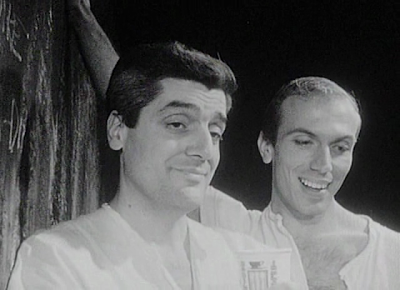Thursday, September 13, 2012
Vapors
Out of the 27 or so films gay gutter-auteur Andy Milligan directed, Vapors (1965) – his first featurette – is quite possibly his most honest, intimate, and damning work. Written by Hope Stansbury – who would later star in subsequent Milligan efforts like The Degenerates (1967) and The Rats Are Coming! The Werewolves Are Here! (1972) – Vapors is a work “From the Tearoom to the Steamroom” (poster tagline) about a couple qualm-ridden queers as they get-on in a homo-hotspot; a steamy yet mostly static steamroom full of hysterical and horny queens. Glaringly more serious and melodramatic than most of Milligan’s subsequent works, aside from his once-lost-but-now-found British masterpiece Nightsbirds (1969) – the director’s last black-and-white film – Vapor is a suitably gritty and amateurishly directed 32-minute 16mm b/w short that gives the viewer a pithy yet punchy glimpse into Milligan’s stunted artistic potential as the director that would later focus almost exclusively on crazy and crappy camp as opposed to the omnipresent debauchery that consumed his personal life and inevitably led to his demise via AIDs during the early cockcrow hours of June 3, 1991, thus resulting in an ignoble burial in an unmarked grave somewhere in Los Angeles. With unflattering black comedies like Bruce Kessler’s The Gay Deceivers (1969) and William Friedkin’s The Boys in the Band (1970) being quite prevalent during the late-1960s/early-1970s – works that expressed the self-loathing trials and tribulations a homo in a pomo world – Milligan’s Vapors proves to be a more brash, glum, and dispiriting work that is scantly side-splitting but often unintentionally silly, thus it is no surprise to me that the exploitation director chose to focus his filmmaking career on the exceedingly degenerate (at least, for the time) world of sexploitation and dimestore horror like his better known works The Ghastly Ones (1968), Guru, the Mad Monk (1970), and Fleshpot on 42nd Street (1973). Originally getting his start working on sadomasochistic, hyper-camp renditions of players like Lord Dunsany's The Glittering Gates and Jean Genet's The Maids with the Caffe Cino – a small café-based theatrical group composed of an assortment of aberrosexuals – Milligan also owned and operated a clothing boutique named Ad Lib; both of which activities would act as a crucial source of inspiration and training for the hapless filmmaker. Of course, arguably the greatest influence behind Vapors – a work set in New York's St. Mark's bathhouse – was Milligan’s own personal erotic exploits in tearooms and steamrooms that involved anonymous, unprotected sex, which he would ultimately pay for with his life and dignity.
As someone who grew up with a physically and emotionally abusive alcoholic mother of a hefty, bovine build, it is no surprise that Vapors features the following line from a streamroom attendant early on in the film, “Well, you can’t trust your own mother these days. How ya gonna trust..uh..a recent acquaintance?” The steamroom employee must have gotten to know his customers very well as foreboding paranoia and distrust, especially of women, act as deep-seated themes of Vapors. As the sometimes prissy and always pessimistic protagonist Thomas (Gerald Jaccuzzo) states early on in Vapors to his prospective lover Mr. Jaffee (Robert Dahdah), “Do you get the strange felling someone is staring at us?” To his credit, indeed, a virtual parade troupe of queens and sexual inverts are watching the two men in a viciously voyeuristic fashion as they snidely giggle like a pack of Pop-Rocks-addicted toddlers at a nudie bar, thus making it seem as if the viewer of Vapors is in on the same sleazy action with them. Although a totally different film with an inherently different agenda, Vapors often feels like a neurotic and anti-erotic adaptation of Jean Genet’s sole (and disowned) cinematic effort Un chant d'amour (1950) aka A Song of Love. Like the hypnagogic libertine short directed by the gay ex-con frog writer, Vapors is a work that would anticipate the sexually-charged films of Andy Warhol. Of course, gay-ghetto-based homoeroticism is not the only indulgent ingredient of Vapors that would later appear in the works of Warhol, as Milligan packed the short with a bitter cocktail of misogyny and misery. For instance, during Vapors Mr. Jaffee discusses in detail his disdain for his wife’s less than dainty feet and her abiding inability to throwaway soiled menstrual sanitary pads. Jaffee also fondly reminisces to Thomas about his prematurely deceased son, a handsome and soft-skinned high school football player that the man speculates may not have been his actual progeny due to his lack of physical resemblance who died in a freak drowning accident and whose corpse was subsequently mutilated by hungry snakes. Needless to say, Vapors concludes in an appropriately anti-climatic manner, as if Kenneth Anger’s celluloid wet-dream Fireworks (1947) merely feebly fizzled instead of exploding in a most fiercely phallocentric fashion.
Ultimately, Vapors is a bleak yet puissant testament to the emptiness and humiliation of gay life during the pre-Stonewall era, henceforth acting as an unofficial fictional meladramatic supplement to the real-life anonymous sexual excursions featured in the William E. James presented document Tearoom (1962). Thus, it is shame that Milligan, a misunderstood man whose film The Ghastly Ones (1968) was described by popular hack horror author Stephen King as, "..the work of morons with cameras," never fully bloomed into the "sort of a Douglas Sirk figure" that Danish auteur Nicolas Winding Refn (Valhalla Rising, Drive) so cordially described him as, yet Vapors and Nightbirds, which also unfortunately happen to be two of the trash-auteur filmmaker's least-seen films, are a testament to the fact that underneath all the fairy dressmaking and illegally solicited sodomy was a serious cinematic artist with something truly ghastly to express.
-Ty E
By
soil
at
September 13, 2012
![]()
Subscribe to:
Post Comments (Atom)
Soiled Sinema 2007 - 2013. All rights reserved. Best viewed in Firefox and Chrome.









No comments:
Post a Comment